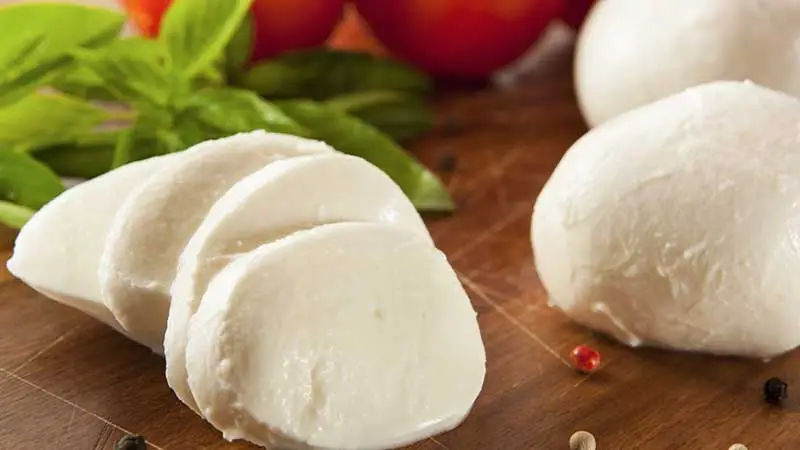Are you a fan of the creamy and delicious taste of fresh mozzarella? Do you know Is fresh mozzarella healthy? While it’s undoubtedly one of the most popular cheese options, many health-conscious individuals might wonder if this indulgent delight is all that healthy.

Fresh mozzarella can be a healthy choice. It is a high-quality source of protein and essential nutrients like calcium. Compared to other cheeses, it is lower in calories. However, moderation and portion control are important due to their fat content. Consider dietary needs and goals when incorporating fresh mozzarella into a balanced diet.
In today’s blog post, we’ll explore whether fresh mozzarella is healthy for our bodies. So sit back, relax, and get ready to learn all about the nutritional benefits (and possible drawbacks) of everybody’s favorite cheese – fresh mozzarella!
Is fresh mozzarella healthy?
Fresh mozzarella is a healthy food. It’s a good source of protein and calcium, and it doesn’t contain any unhealthy additives.
It is also naturally low in sodium and fat, so it can help you maintain a healthier diet. The cheese is also gluten-free, making it an ideal option for those with gluten sensitivities.
Fresh mozzarella has a mild flavor that makes it versatile enough to be used in many dishes, from salads to pizzas. So, fresh mozzarella is worth considering if you’re looking for something nutritious and tasty to add to your meal plan.
Fresh mozzarella couldn’t be easier to make. All you need is quality milk and rennet or citric acid. You can get creative and add some herbs or spices to flavor the cheese. The process isn’t difficult either; you can have fresh mozzarella quickly with a few simple steps.
Nutritional breakdown of fresh mozzarella cheese
A one-ounce serving of fresh mozzarella cheese contains approximately:
- Calories: Around 70-85 calories
- Protein: Approximately 5-6 grams
- Fat: About 5-7 grams
- Saturated Fat: Around 3-5 grams
- Carbohydrates: Less than 1 gram
- Sugar: Less than 1 gram
- Cholesterol: Approximately 15-20 milligrams
- Sodium: About 130-200 milligrams
- Calcium: Around 130-200 milligrams
While mozzarella cheese does contain saturated fat, it is a fairly lean cheese compared to other cheese types. It is also a good source of protein and calcium.
How to Choose Quality Fresh Mozzarella?
When it comes to fresh mozzarella, you want to choose a brand that uses high-quality milk. Look for brands that use whole milk from grass-fed cows.
You also want to choose a brand that uses traditional techniques, such as the Italian buffalo-milking method. These brands will typically have a higher fat content, but the fat is the healthy kind that your body needs. Here are a few factors to consider:
1. Check the Texture:
Fresh mozzarella should have a creamy and elastic texture. Press the cheese gently; it should bounce back. The texture should be extremely smooth.
2. Taste for Freshness:
Fresh mozzarella tastes mild and lightly salty with a slightly sweet flavor. You may want to avoid the cheese with an off-putting or strong smell.
3. Inspect Packaging:
Pay attention to how the cheese is packaged, indicating quality and freshness. If you’re buying pre-sliced mozzarella, ensure it’s sealed in airtight packaging, and there are no signs of mold or discoloration on the cheese slices.
4. Check the Ingredients:
High-quality fresh mozzarella should only contain two ingredients—milk and salt. It may not be a good choice if it contains additional preservatives, additives, or fillers.
5. Choose Organic:
Organic mozzarella generally has the best flavor and highest quality. However, it may be more expensive than non-organic brands.
Mozzarella cheese benefits and disadvantages:
Benefits of Mozzarella Cheese:
- Good Source of Protein: Mozzarella cheese is an excellent source of protein and contains all nine essential amino acids, providing the body with amino acids it cannot produce. Eating mozzarella cheese can help maintain healthy muscles and even aid muscle recovery after a workout.
- Rich Source of Calcium: Mozzarella cheese is loaded with calcium, helping to keep bones and teeth strong and healthy. Adequate calcium intake is important for everyone, especially for growing children and adolescents, as it helps build strong bones that will carry them through their later years.
- High in Vitamin B12: Mozzarella cheese also contains high amounts of vitamin B12, which is important in maintaining the nervous system, producing red blood cells, and breaking down some fatty acids. Low levels of B12 can lead to problems such as fatigue and depression, so consuming mozzarella cheese can help prevent these issues from developing.
- Conjugated Linoleic Acid (CLA): In addition to its other nutritional benefits, mozzarella cheese contains conjugated linoleic acid (CLA), an important fatty acid that has been linked to many health benefits, including improved metabolic function and promoting weight loss.
- Versatile: Mozzarella cheese is incredibly versatile and can be enjoyed on its own or as a part of many different dishes. From a delicious melt-over cheesy pizza to adding texture to creamy pasta dishes, mozzarella cheese is always a welcome addition.
Disadvantages of Mozzarella Cheese:
- High in Saturated Fat: Like most dairy products, mozzarella cheese contains high amounts of saturated fat, which can raise cholesterol levels if consumed in large amounts. It is best to consume it in moderation and substitute it with leaner proteins when possible.
- Salt Content: Many mozzarella cheeses are also high in sodium, which can cause water retention, bloating, and increased blood pressure for those sensitive or prone to hypertension. To reduce the risk, try looking for low-salt varieties or choosing unsalted versions whenever possible.
- Lactose Intolerance: For those who suffer from lactose intolerance or other dairy sensitivities, consuming mozzarella cheese may lead to digestive issues such as abdominal bloating, cramping, and even diarrhea if the body cannot digest lactose properly.
- Allergy Risks: For those with dairy allergies, consuming mozzarella cheese can be dangerous as it may cause severe allergic reactions such as rashes, hives, difficulty breathing, and even anaphylaxis. If you suffer from milk-related allergies, always check the ingredients in mozzarella cheese products before consuming.
- Calorie Intake: Cheese, in general, is high in calories, and mozzarella cheese is no exception. Consuming too much cheese can easily add to excess caloric intake, leading to weight gain when uncontrolled. Therefore, it’s important to remember that moderation is key when enjoying mozzarella cheese.
Guidelines for Safely Storing & Preparing Fresh Mozzarella:
Regarding cheese, fresh mozzarella is about as healthy as it gets. This delicious cheese is low in sodium and fat and a good source of protein.
However, like all dairy products, fresh mozzarella can harbor bacteria that can cause food poisoning. That’s why it’s important to take care when storing and preparing fresh mozzarella.
Here are Some tips for safely storing and preparing fresh mozzarella:
- Usemozzarellawithin within 7-10 days of opening the package.
- Before using mozzarella, cut off any moldy or discolored portions. Mold can spread quickly, so it’s best to err on caution and discard any questionable pieces.
- Mozzarella can be eaten raw or cooked. If cooking mozzarella, cook it until it reaches an internal temperature of 165 degrees Fahrenheit to kill harmful bacteria. – To prevent cross-contamination, always use separate cutting boards and utensils when handling raw mozzarella.
- If you’re not going to use all of the fresh mozzarella in one meal, store the leftovers in an airtight container in the refrigerator for up to 4 days.
- Avoid using transparent plastic wrap or bags to store mozzarella, as moisture can collect and promote bacterial growth on the surface of fresh mozzarella.
- Moisture is also a problem when freezing mozzarella; ensure that any pieces you plan to freeze are dry before wrapping them in plastic or placing them in a freezer bag.
- Reheat cooked mozzarella until it reaches 165 degrees Fahrenheit or until it’s steaming hot.
- After handling raw mozzarella, wash your hands with soap and warm water for at least 20 seconds before preparing anything else.
Conclusion:
As you can see, eating fresh mozzarella has many health benefits. Not only is it a good source of protein and calcium, but it also contains probiotics that can improve your gut health. So fresh mozzarella is a great option if you’re looking for a delicious and nutritious cheese to add to your diet.
With all the health benefits it has to offer, eating fresh mozzarella is a smart choice. Add it to salads, pizzas, sandwiches, and more for an extra flavor boost and nutrition.
I hope this article has helped convince you of the benefits of eating fresh mozzarella cheese. It’s a great way to add nutrition and flavor to your meals without sacrificing taste or health.
